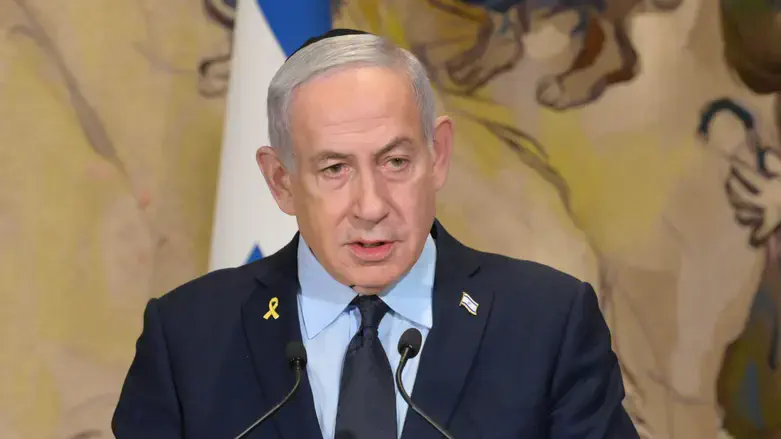
Prime Minister Benjamin Netanyahu delivered a deeply personal and emotional address on Holocaust Martyrs' and Heroes' Remembrance Day, speaking at the Knesset’s annual “Unto Every Person There is a Name” ceremony. Reflecting on his late father-in-law Shmuel Ben-Artzi’s life, Netanyahu wove family memory into the national act of remembrance.
“In 1933, my late father-in-law, Shmuel Ben-Artzi, then Shmuel Hahn, left his hometown of Biłgoraj, and via Warsaw, immigrated to the Land of Israel,” Netanyahu began. He described Shmuel’s departure from Europe as a moment of familial and ideological tension. “His father Moshe accompanied him along the way and tried to persuade him in every way not to immigrate.”
“He tried to persuade him by using some of the values he learned at home, which he really loved,” Netanyahu said. “He also told him: 'You have nothing over there. What will you do there? Look at what’s right here.'”
Netanyahu recounted how Shmuel struggled between staying with the family he loved and following his conviction to build a new life in the Land of Israel. “He wanted with all his heart to be a pioneer... He would build the foundation in Bnei Brak.”
Once in Israel, Shmuel worked in orchards for eight years before becoming an educator. “He was one who left his mark on many generations, including people who passed through the Knesset as well as those in the media who also talked about him,” Netanyahu said. “'The educator' — that's how they called him.”
A respected Bible scholar, Shmuel was invited by David Ben-Gurion to participate in his first organized Bible class and uniquely received medals from both the Irgun and the Haganah. “I think Shmuel was the only one in the country who received medals from both the Irgun and the Haganah,” Netanyahu added.
Shmuel also channeled his grief into poetry, earning the Ka-Tzetnik Prize for Holocaust literature. Netanyahu described how Shmuel sent money to his family in Poland until the outbreak of World War II. When correspondence stopped, he realized something terrible had happened. “He expressed this in several moving poems expressing longing but mostly despair,” Netanyahu said.
Netanyahu read from one of Shmuel’s poems, To Europe: "My eyes are immersed in a river of sorrow, a tear has fallen because of this grief! They drown my people in blood, and my Lord is silent… Like a stone in a field, I too will be silent before the crescent moon. From Europe, left the Torah, and from Germany, the creed; Killed and strangled, murdered and slaughtered! For the ‘Jude’ a bullet’s a waste — Only poisonous gas in a closed trailer, And with no spare time — Buried him alive! G-d, justice, the sanctity of human life. Ha-ha-ha mocks man, Long live genocide."
The Prime Minister then solemnly recited the names of Shmuel’s murdered family members — parents, siblings, uncles, aunts, and cousins from Biłgoraj and Tarnogród.
“In this genocide, my father-in-law's entire family from Biłgoraj and Tarnogród in Poland perished,” Netanyahu stated.
“Shmuel passed away at the age of 97,” Netanyahu said. “But throughout his entire life, even during the last days before he passed away, whenever I mentioned Yehudit's name, he would cry. He always cried.”
He closed with the words, “May their memory be a blessing. May G-d avenge their blood.”

